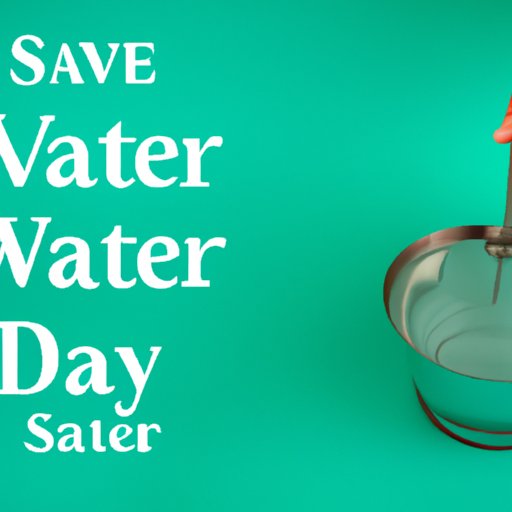
Introduction
Water is one of the most precious resources we have on this planet. It sustains life and is essential to our daily activities, from cooking and cleaning to farming and manufacturing. However, with the growing population and increased demand for water, it’s essential to conserve this valuable resource. In this article, we’ll explore some practical strategies and tips for saving water in different settings, from homes to businesses and schools.
7 Easy Ways to Conserve Water at Home
There are many ways to save water at home. For example, installing low-flow showerheads and faucets can reduce water usage significantly. Similarly, rainwater harvesting can help collect and store rainwater for future use in watering the garden or cleaning. Fixing leaks is another easy and effective way to save water, as dripping faucets or leaky pipes can waste a considerable amount of water. Other practical tips include using native plants in landscaping, reusing graywater, and being mindful of water usage when running water appliances like washing machines and dishwashers.
Save Water While Gardening
Gardening is a great way to connect with nature and improve the aesthetic value of your home. However, it can also be a significant drain on water resources. To conserve water while gardening, one can adopt several strategies. For example, watering plants early in the morning or late in the evening can reduce water loss through evaporation. Additionally, planting native or drought-resistant plants can help you save water while still enjoying a lush and vibrant garden. Lastly, adding organic matter to your soil can help retain moisture and reduce water needs.
Tips for Saving Water in the Kitchen
The kitchen is another area where water usage can quickly add up. To reduce water usage in the kitchen, you can take several practical steps. You can, for instance, use a dishwasher instead of washing dishes by hand, as dishwashers can be more water-efficient. You can also only run the dishwasher when it’s completely full to maximize water usage. Additionally, you can install a low-flow aerator on your kitchen faucet as it can help reduce water usage by up to 50%.
How to Save Water When Doing Laundry
Laundry is another household activity that requires a considerable amount of water. To conserve water when doing laundry, you can adopt several strategies, such as using a front-loading washing machine, which uses less water than top-loading machines. You can also choose to use an eco-friendly laundry detergent that requires less water for the rinse cycle. Finally, only washing clothes when they are visibly dirty and running full loads can help reduce water usage effectively.
Conserving Water in the Bathroom
The bathroom is one of the primary sources of water usage in any home. By adopting some practical strategies, you can reduce water usage in the bathroom. For example, turning off the water tap when brushing your teeth or shaving can help save gallons of water daily. Additionally, taking shorter showers and fixing leaky faucets can also save considerable amounts of water over time.
Water Conservation for Businesses
Businesses can also adopt water-saving techniques that can help save water and reduce costs. For instance, installing rainwater harvesting systems can help businesses collect and store rainwater for future use in toilets, outdoor watering, or other processes. Additionally, retrofitting fixtures with low-flow alternatives and implementing water-efficient landscaping can help reduce water usage significantly.
Teaching Kids About Water Conservation
Teaching children about water conservation is vital as it helps develop responsible and conscious attitudes toward water use. Some practical strategies and tips that can be used to teach children about water conservation include using a glass of water when brushing teeth, turning off the tap when not in use, or planting a native garden.
Conclusion
Water conservation is essential, and adopting some practical strategies and tips can help reduce water usage significantly. From installing low-flow showerheads to collecting and storing rainwater, everyone can do their bit to contribute to water conservation efforts. I encourage readers to implement the strategies and tips discussed in this article to become more mindful of their water usage and contribute to a more sustainable future.




